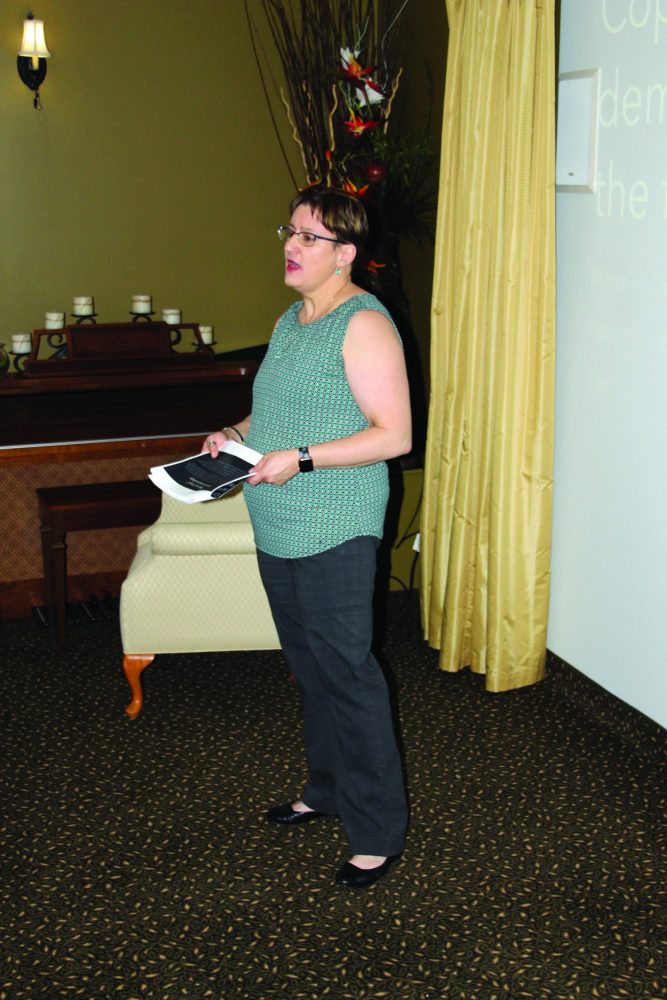People learn about dementia, how to have a good visit
By Rob Vogt
There are things you can do to have a successful visit when you have a loved one with dementia.
More than 25 people attended a lunch and learn presentation at Cottonwood Village on dementia, put on by Marcella Snell, a nurse and the facility’s recreation director.
She described her experience, including six years focused on long-term care in a nursing home with a dementia unit. Often her patients entered nursing care with advanced dementia.
Dementia is an umbrella term used to describe a set of symptoms affecting brain function. It is a chronic disease without a cure that becomes progressively worse as time passes.
Those with dementia will have a decline in brain functions such as memory, planning, language, and judgement-making ability.
There are physical changes such as loss of coordination, loss of bladder and bowel control, weakening and stiffening muscles, as well as problems standing and walking. A significant change in personality and behaviour is possible and common as the brain function has been altered.
Snell stressed each person experiences dementia differently. It is a unique as your personality.
There are several types of dementia:
• Alzheimer, which is the most common form, contributing 60 to 70 percent of cases;
• Vascular dementia, which results from poor blood flow to the brain;
• Lewy Body dementia, which is a neurodegenerative disease with abnormal proteins;
• Frontotemporal dementia, which is damaged nerve centres in the brain limiting brain function;
• Korsakoff dementia, which results from long periods of low Vitamin B1, or excessive alcohol use.
There are seven stages to dementia: normal behaviour; forgetfulness; mild decline; moderate decline; moderately severe decline; severe decline; and very severe decline.
Snell said dementia is like a deck of cards. A healthy brain puts its cards in order by both suit and number. For example, the eight of clubs will be between the seven and nine of clubs respectively, in most people’s minds.
A demented brain still has all the cards in the deck, but they are unable to control the order of the cards and there is a constant shuffle in their brain. In the morning it could be the present day, while in the afternoon it might be 1945 to them. Time and date become fluid and move in unpredictable ways.
Coping with dementia
Dementia is interference in normal brain functions. It can make communication with a loved one a struggle as they no longer may be able to take in new information, absorb it, or understand because the brain is failing. This can make visits difficult.
There is a misconception that if someone with dementia may not be able to recall your name or relationship they have forgotten you. That is not true.
Dementia affects the brain’s ability to recall specific words, names and relationships. It may be delayed but it is not gone.
“Your visit matters,” Snell said.
She added the power of love and simple touch stimulate the brain.
“The simple power of touch is extraordinary,” Snell said.
She then asked the question that dementia demands: Do you want to be right or be happy?
Someone with dementia may be re-living the past, and refer to things that no longer exist.
One response is to correct the person but, Snell cautioned, that can derail a visit and make the person feel embarrassed, confused, silly or even dumb.
Another response could be to “go with the flow” and reassure the loved one. This may not be “right” but it leaves the person with their dignity intact and avoids feelings associated with unhappiness.
Snell suggested people play the role of detective and collect clues.
For example, a person with dementia may constantly rub their arms. It can signify pain, being cold and needing a sweater, or feeling anxious. Snell suggested looking for bruising, considering if the room is cold, or asking if they need anything.
Keys to a successful visit
Snell offered a guide to successful visits:
• Visit earlier in the day
The demented brain tires quickly and by afternoon or evening the confusion increases.
• Get to their level
Place yourself in front of the person at the same level, make and maintain eye contact, and remain still.
• Reduce distractions
Take them somewhere quiet if possible.
• Stay calm and be patient
Brain function impairment means it can take longer to find the right word and longer to get it out. Give them time to answer, and try not to become frustrated by pauses.
• Be aware of your body language
Crossed arms, sighing and appearing angry can frighten the person as they are still attuned to non-verbal communication.
• Be just as aware of their body language
Watching them can tell you a lot about how they are feeling in the moment.
• Speak slowly and use short simple sentences
The demented brain takes longer to process the words you say and to assign the words their meaning.
• Avoid correcting the person or statements such as “I already told you this”
This makes the person feel as if they are wrong, embarrassed and feeling confused. If grandma thinks it is 1945 and wants to celebrate the war ending, join her in that rather than trying to re-orient her to present day.
• Be encouraging
Offer non-verbal encouragement such as nodding your head as they speak, or smiling as they speak.
If your loved one can no longer speak
There are several keys to success:
• Play music you know they like. They may grab your hand and smile.
• Play “remember when”. Long-term memory remains intact and they will be able to relive a fun event with you telling the story.
• Bring a favourite snack or beverage.
• Take them outside, if possible, for some sun and fresh air.
• Bring pictures of family members and let them hold the picture while you tell them about that person.
• Visit them early in the day. The demented brain becomes tired much faster than a healthy one. This means morning will be clearest and an optimal time to visit.
There are also cues to help loved ones remember.
One is to start by saying hello and saying their name. It immediately gives a cue to who you are. Another is to mention the season as in “Would you like to get some summer air?”. This makes it easier for them to process and prepares them for the next step.
Snell also recommended simple and short answers. Someone with dementia may ask the same question over and over. Short and simple answers help them process.
Who can be affected?
In most cases, dementia is not related to a family link. There are genetic forms of dementia but are very, very rare and make up less than one per cent of dementia cases.
Dementia can affect anyone. You do not need a family history to be affected. Most people are affected over the age of 65.
Reducing the risk for dementia
There are two kinds of risk factors.
Non-modifiable risk factors are ones that cannot be changed or eliminated. They include age, family history, and genetics.
Modifiable risk factors can be controlled and include choosing not to smoke; limiting alcohol consumption; staying active; wearing a helmet when biking or skiing; managing health conditions such as diabetes and high blood pressure; and ensuring you get adequate sleep.
All of these are proven risks for later developing dementia.

Photo by Rob Vogt

